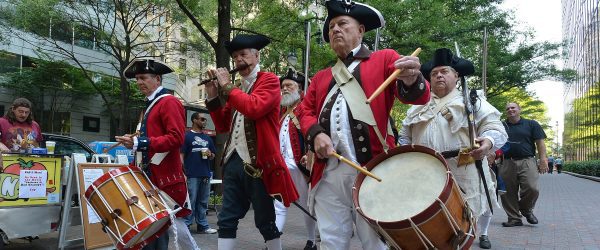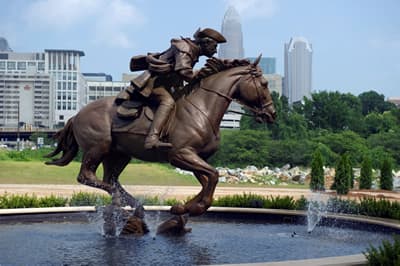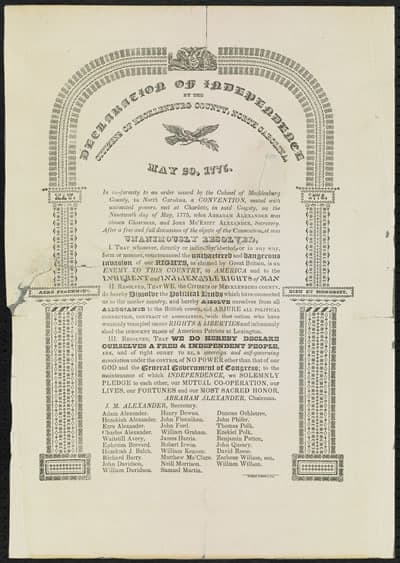Five facts to know about Meck Dec Day

In Charlotte, “Meck Dec Day” is celebrated every year on May 20. As an observance of the first declaration of independence against British rule – more than a year before the country’s official declaration on July 4, 1776 – it remains unfamiliar to many Charlotteans. UNC Charlotte’s Atkins Library Specials Collections counts among its holdings a rare 1826 printing of the Mecklenburg Declaration.
Here are five things to know about this unique Charlotte holiday coming up on Sunday:
- The Mecklenburg Declaration of Independence is said to have been produced on May 20, 1775, when influential men of Charlotte (then known as Charlottetown) and surrounding area declared themselves “free and independent” of the British crown. However, a written copy of the Declaration was not available publicly until 1819, when U.S. Sen. Nathaniel Macon presented it to the Raleigh Register. Macon attested the original copy was destroyed in an 1800 fire, and that one of its signers, John McKnitt Alexander, recreated the document from memory and gave it to his son, William Alexander, who then shared it with Macon. William Polk, whose father, Col. Thomas Polk, called the original meeting, solicited testimony from those who claimed to have been present and corroborated the existence.
 James Jack was a Revolutionary War officer who rode from Charlotte to the Second Continental Congress in Philadelphia to deliver a copy of the Mecklenburg Declaration and/or the Mecklenburg Resolves. On May 19, 1775, news of the fighting at Lexington and Concord in Massachusetts reached Charlotte. As the story goes, first an emotional “Declaration” was composed that proclaimed independence; it was read aloud on May 20 at noon from the courthouse steps. The committee then wrote a second, more organized and tempered document, titled Mecklenburg Resolves. James Jack carried both documents to Congress. He left in June, stopping first in Salisbury to read them publicly in district court. In Philadelphia, he discovered the North Carolina delegates, still hoping for reconciliation with England, considered the action premature.
James Jack was a Revolutionary War officer who rode from Charlotte to the Second Continental Congress in Philadelphia to deliver a copy of the Mecklenburg Declaration and/or the Mecklenburg Resolves. On May 19, 1775, news of the fighting at Lexington and Concord in Massachusetts reached Charlotte. As the story goes, first an emotional “Declaration” was composed that proclaimed independence; it was read aloud on May 20 at noon from the courthouse steps. The committee then wrote a second, more organized and tempered document, titled Mecklenburg Resolves. James Jack carried both documents to Congress. He left in June, stopping first in Salisbury to read them publicly in district court. In Philadelphia, he discovered the North Carolina delegates, still hoping for reconciliation with England, considered the action premature. - The authenticity of the Declaration is controversial, starting with the posthumous publication in 1829 of the works of Thomas Jefferson. John Adams, having read the 1819 publication, wrote to Jefferson, assuming he had “copied the spirit, the sense and the expressions of it verbatim into his Declaration of the Fourth of July 1776.” In a corresponding letter written July 1819 to John Adams, Jefferson dismissed the Mecklenburg Declaration as a hoax. The North Carolina legislature in 1830-31 was so upset by the letters that it set up an investigative-committee, but with the 50th anniversary celebration approaching, all evidence gathered favored the Declaration. In 1907, publication of William Henry Hoyt’s “The Mecklenburg Declaration of Independence: A Study of Evidence Showing That the Alleged Declaration of Mecklenburg County, North Carolina, on May 20th, 1775, Is Spurious” damaged the credibility of the tale. Since then, scholarly research about the timeline and corroborating documents have not disproven the existence of the Declaration. Still, lacking an original copy that predates the Philadelphia declaration, we may never know for certain.
- Supposedly, public reading of the Mecklenburg Declaration took place on May 20, 1775. Its commemoration is considered important to the people of Charlotte and has been celebrated not just locally, but statewide and nationally by four sitting presidents, celebrities and politicians. For many years, public schools were closed in observance of Meck Dec Day. In 1875, the Meck Dec centennial celebration brought 40,000 people to Charlotte at a time when the city’s population was 6,000.
 In 1826, Dr. James Gettys McGreedy Ramsey, grandson of John McKnitt Alexander – an original signer of the Mecklenburg Declaration – contracted with a with a printer in Tennessee to produce the first separate printing of the declaration. In his letter to the printer, McGreedy states that he wished to “Rescue from comparative oblivion so briliant [sic] an event in the early history of our Country.” Only six other copies of this printing are known to exist.
In 1826, Dr. James Gettys McGreedy Ramsey, grandson of John McKnitt Alexander – an original signer of the Mecklenburg Declaration – contracted with a with a printer in Tennessee to produce the first separate printing of the declaration. In his letter to the printer, McGreedy states that he wished to “Rescue from comparative oblivion so briliant [sic] an event in the early history of our Country.” Only six other copies of this printing are known to exist.
Want more?
The Special Collections and University Archives at UNC Charlotte’s Atkins Library collects, preserves and provides access to unique materials on the history and culture of UNC Charlotte and the Charlotte region. Through rare books, digital collections, oral history interviews, the personal papers of our region’s notable individuals, the records of local organizations, local government documents, and the university’s own historically important records, these materials are heavily relied on by researchers and students alike to understand our community’s past through encounters with original primary source materials.
Tricia Kent is a documents technical assistant in the Atkins Library, Special Collections.
 James Jack
James Jack In 1826, Dr. James Gettys McGreedy Ramsey, grandson of John McKnitt Alexander – an original signer of the Mecklenburg Declaration – contracted with a with a printer in Tennessee to produce the first separate printing of the declaration. In his letter to the printer, McGreedy states that he wished to “Rescue from comparative oblivion so briliant [sic] an event in the early history of our Country.” Only six other copies of this printing are known to exist.
In 1826, Dr. James Gettys McGreedy Ramsey, grandson of John McKnitt Alexander – an original signer of the Mecklenburg Declaration – contracted with a with a printer in Tennessee to produce the first separate printing of the declaration. In his letter to the printer, McGreedy states that he wished to “Rescue from comparative oblivion so briliant [sic] an event in the early history of our Country.” Only six other copies of this printing are known to exist.